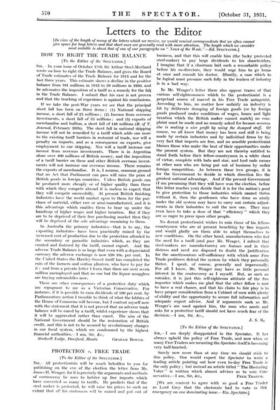Letters to the Editor
[In view of the length of many of the letters which we receive, we would remind correspondents that we often cannot give space for long letters and that short ones are generally read with more attention. The length which we consider most suitable is about that of one of our paragraphs on " News of the Week."—Ed. SPECTATOR.]
HOW TO RIGHT THE TRADE BALANCE
[To the Editor of the SPECTATOR.] Sin,—In your issue of October 17th Sir Arthur Steel-Maitland wrote on how to right the Trade Balance, and gives the Board of Trade estimates of the Trade Balance for 1913 and for the last three years. This estimate shows a decline in the positive balance from 181 millions in 1913 to 39 millions in 1930, and he advocates the imposition of a tariff as a remedy for the fall in the Trade Balance. I submit that his case is not proven and that the teaching of experience is against his conclusions.
If we take the post-War years we see that the principal short fall has been on three items : (1) National shipping income, a short fall of 25 millions ; (2) Income from overseas investments, a short fall of 35 millions ; and (3) exports of merchandise and bullion, a short fall of 148 millions (B. of T. Journal, February 26th). The short fall in national shipping income will not be remedied by a tariff which adds one more to the existing tariff barriers in restraint of trade, nor will a penalty on imports, and as a consequence on exports, give employment to our shipping. Nor will a tariff increase our income from overseas investments. There is in Argentina alone over 400 millions of British money, and the imposition of a tariff barrier on these and other British overseas invest- ments will not increase our overseas income. There remains the exports of merchandise. It is, I assume, common ground that no Act that Parliament can pass will raise the price of British goods in foreign countries. Unless British goods can be produced more cheaply or of higher quality than those with which they compete abroad it is useless to expect that they will compete successfully. At present British finishing industries have the world market open to them for the pur- chase of material, either raw or semi-manufactured, and it is this advantage which enables them to bear up under the handicap of higher wages and higher taxation. But if they are to be deprived of their free purchasing market then they will be deprived of the sole advantage remaining to them.
In Australia the primary industries—that is to say, the exporting industries—have been practically ruined by the increased cost of production due to the protection afforded to the secondary or parasitic industries which, as they arc created and fostered by the tariff, cannot export. And the adverse Trade Balance is so large that even with a depreciated currency the adverse exchange is now £30 10s. per cent. In the United States the Hawley-Smoot tariff has completed the ruin of the farmers and cotton planters, who have to pay for it ; and from a private letter I learn that there are over seven million unemployed and that no one but the liquor smugglers are buying automobiles now.
There are other consequences of a protective duty which arc repugnant to me as a Victorian Conservative. For instance, if it is possible to earn dividends of 100 per cent. by Parliamentary action I tremble to think of what the lobbies of the House of Commons will become, but I content myself now with the statement that it is not proved that an adverse trade balance will be cured by a tariff, whilst experience shows that it will be aggravated rather than cured. The aim of the National Government should be the restoration of British credit, and this is not to be secured by revolutionary changes in our fiscal system, which are condemned by the highest financial authorities.—I am, Sir, &c., Studwell Lodge, Drarford, Hants. GRAHAM BOWER.






































 Previous page
Previous page